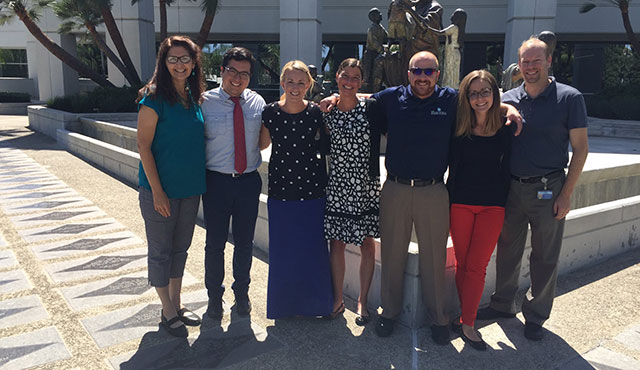Catholic Schools in the Diocese of Orange are advancing teaching and learning through a process called blended learning. While many people define blended learning simply as a combination of computer devices and a teacher in the classroom, true blended learning is much more.
In its truest sense, blended learning is a highly involved instructional strategy designed to meet the individual needs of all students and to enable students to take ownership over their own learning. Of course, technology integration remains a vital component of blended learning, which has proven successful at improving student engagement and personalization in the classroom. “When high quality teaching is infused with the dynamic use of technology, personalized student learning becomes possible,” says Beth Thomas, teacher at St. Junipero Serra Catholic School in Santa Margarita.
The single most important aspect of a successful blended learning classroom is an effective teacher. Consequently, the Diocese of Orange, with the guidance of Director of Educational Technology Scott Gotreau, has committed to building a strong blended learning program at Catholic schools throughout the diocese. In June 2017 the Department of Catholic Schools, through the generous financial support of the Orange Catholic Foundation, launched the ABLE (Advancing Blended Learning Education) Fellowship, which is designed to provide direct professional support to teachers who demonstrate a desire to implement a blended-learning environment in their classrooms. The program is modeled after a similar program, established by the Highlander Institute, which has proven successful in the state of Rhode Island.
Following a rigorous application process, six outstanding teachers were selected from various schools throughout the diocese as fellows to provide peer coaching to colleagues in other diocesan schools. These teachers, already highly successful educators in their own right, have committed to undergoing intensive training in the blended-learning process. In addition to their regular teaching duties, each teacher has been assigned to coach 2-4 “early adopter” teachers at another school in the diocese over a two-year period to help enhance their blended-learning practices. Communication between coach and early adopter includes virtual communication, such as email or online meeting, as well as face-to-face communication. Coaching strategies can include goal setting, data analysis, co-planning, or even co-teaching a lesson. “Relationships are the core to blended and personalized instruction,” says ABLE Fellow Erin Watson.
Our six ABLE fellows are: Marcus Cabrera (from Our Lady of Fatima), Julie Hutchison (St. Juliana), Genny Kahlweiss (St. Columban), Noah Loungarikis (St. Edward the Confessor), Beth Thomas (St. Junipero Serra), and Erin Watson (St. Catherine of Siena). Thus far, the fellows and the schools where they are coaching (Mission Basilica, St. Norbert, School of Our Lady, Holy Family, St. Joseph in Placentia, and Christ Cathedral Academy) have all been quite positive about the process and have seen very encouraging instructional changes from the early adopters.
The intent of the fellowship is to create an instructional model that engages students and encourages lifelong learning through a more personalized learning approach. “My vision for learning in the 21st century is an environment in which each learner explores and masters content that align with desired standards, while providing as much of an individualized curriculum as possible for each learner,” says ABLE Fellow Noah Loungarikis. Another ABLE Fellow, Julie Hutchison adds, “If we keep our classrooms consistent with what students will be facing in their daily lives and their future, we can best help them to become lifelong learners who thirst for success.” By coaching more and more teachers to develop these types of classrooms, a greater number of students can reap the benefits of a more personalized approach.
The ABLE Fellowship seeks to continue its work by bringing on a second group of fellows for the 2018-19 school year with the intent to place fellows at more schools where they can coach more teachers. Thanks to the Orange Catholic Foundation and the ABLE Fellows, Catholic Schools in the Diocese of Orange are truly experiencing transformational teaching and learning.
For more information on the ABLE Fellowship: ablefellows.weebly.com or follow us on Twitter #ABLEOC. If you wish to donate to the fellowship, please visit the Orange Catholic Foundation website: orangecatholicfoundation.org.

